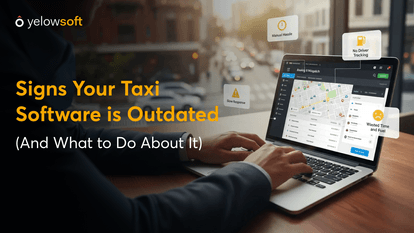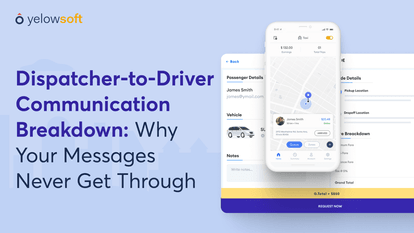The success story of Uber has triggered a wave of on-demand transportation businesses all around the world.
Thanks to smartphones and high-speed internet connectivity, entrepreneurs are establishing on-demand taxi booking startups in all parts of the world these days.
While the Internet and smartphones indeed deserve the credit for success, there is one more thing without which it would have been impossible to provide on-demand transportation services.
Geolocation happens to be a necessary ingredient for developing an innovative on-demand taxi app solution.
In fact, it is due to geolocation that the transportation industry is soaring to new heights in the on-demand transportation services.
What is Geolocation?
Geolocation is basically a technology that makes it possible to fetch the real-time physical location of passengers.
In simple words, the Geolocation technology is the foundation for location-based and on-demand apps.
In fact, the use of geolocation technology is critical for the success of an on-demand transportation business. Without geolocation, many on-demand services wouldn’t be able to exist.
An on-demand transportation business is the perfect example that uses geolocation in its everyday operations.
Importance of Geolocation for the On-demand Transportation Business
The reason behind the success of Uber and all other on-demand taxi startups lies in their ability to track their passengers’ locations precisely, making the ride-hailing easy for all.
In other words, geolocation is the key to success for any kind of on-demand transportation business in today’s technology-driven market.
For instance, consider the traditional taxi dispatch software. In the old days, it was difficult for both passengers and drivers to find each other’s exact location and destination.
But, after the implementation of the location tracking system in the taxi industry, challenges like finding locations have been completely eliminated, and taxi services have become much more reliable.
In fact, today, the on-demand taxi business without a location tracking system would be of no use.
Point being? – The use of geolocation in the transportation industry is incomparable.
Specifically, here’s how embedding geolocation technology in your online taxi booking software can benefit your transportation business.
How Does Geolocation Impact the On-Demand Transportation Business
Geolocation is embedded in a tracking system to help find the passenger’s exact location with pinpoint accuracy. Geolocation might seem like a small tech, but it has a huge impact. Let’s explore the impact it has on on-demand transportation.
1. Accurate Pickups and Drop-offs
Geolocation technology ensures drivers can locate passengers precisely, making pickups faster and smoother. No more missed turns, wrong addresses, or waiting in the wrong spot. Passengers feel confident that their ride will arrive on time, and drivers save valuable time by avoiding unnecessary detours.
For instance, ride-hailing apps like Uber or Bolt rely heavily on GPS to match passengers with the nearest driver, minimizing delays. Accurate drop-offs also enhance customer satisfaction by ensuring they reach their destination without confusion.
Overall, geolocation creates a seamless experience, reduces operational friction, and allows drivers to focus on driving safely rather than constantly navigating. In an on-demand transportation business, precision in pickup and drop-off can directly impact ratings, repeat usage, and revenue growth.
2. Dynamic Fare Calculation
Geolocation allows ride-hailing apps to calculate fares dynamically and accurately. By tracking the exact route taken, distance covered, and time spent in traffic, the system ensures fair pricing for both passengers and drivers.
Surge pricing during high-demand hours or busy areas becomes possible because the system can instantly detect where demand is spiking. This eliminates disputes over fare disagreements and ensures transparency.
Additionally, geolocation data helps operators refine their pricing models by analyzing patterns like frequent routes, average trip times, and peak hours. Passengers feel confident they’re paying a fair price, while drivers benefit from optimized earnings. In short, geolocation transforms fare calculation from a generic guess into a precise, reliable, and dynamic process that drives trust and profitability.
3. Safety and Security
Passenger and driver safety is paramount in on-demand transportation, and geolocation plays a critical role. Real-time tracking allows operators to monitor rides, ensuring drivers follow safe routes and passengers reach their destinations securely. In emergencies, operators can quickly locate a vehicle and dispatch assistance.
Geolocation also supports features like “share my ride,” letting passengers share their live location with friends or family, enhancing trust. For drivers, it provides accountability, discouraging unsafe behavior and fostering a professional environment.
By integrating geolocation, businesses not only comply with safety regulations but also build a reputation for reliability, giving passengers peace of mind and drivers confidence, which is crucial for retaining both groups in a competitive market.
4. Fleet Management
For on-demand transportation businesses, managing a fleet efficiently is a major challenge. Geolocation allows operators to track every vehicle in real time, know which cars are idle, which are on trips, and which need maintenance.
This helps dispatchers broadcast and allocate rides effectively, reduce downtime, and prevent overloading some drivers while others stay idle. Real-time tracking also aids in route optimization, ensuring each driver takes the fastest path, saving fuel and time. Geolocation insights allow operators to plan shifts, monitor performance, and spot trends in ride demand across different areas.
By improving operational efficiency, fleet management powered by geolocation reduces costs, enhances service quality, and maximizes revenue, making it a core tool for scaling on-demand transportation businesses.
5. Improve Services Consistently
Geolocation data provides actionable insights into customer behavior and operational patterns. By analyzing where rides are requested most, peak hours, and average travel times, companies can adjust driver allocation, reduce wait times, and enhance service availability.
Operators can identify problem areas, like zones where pickups are delayed or traffic frequently disrupts schedules, and take corrective measures. For passengers, this means faster service and more reliable trips.
Drivers also benefit because improved planning reduces idle time and stress. Over time, this data-driven approach allows on-demand transportation businesses to refine services, introduce new features, and maintain high customer satisfaction, turning operational insights into a competitive advantage that supports long-term growth.
6. Display Location-based Ads
Geolocation enables businesses to target passengers with highly relevant, location-specific promotions or advertisements. For instance, a passenger near a shopping district might receive a discount for a nearby restaurant ride, while someone near an airport could get a special deal for airport transfers.
This level of personalization boosts engagement and increases the chances of repeat bookings. Businesses can also partner with local vendors to create mutually beneficial promotions. Geolocation-driven marketing ensures ads are timely, contextually relevant, and more likely to convert into revenue.
It’s a win-win: passengers get value-added offers, and operators drive higher utilization of rides while creating an additional revenue stream from location-based marketing partnerships.
Conclusion
On the whole, geolocation can completely transform a traditional transportation business into a modern, on-demand business by interacting with its customers in real-time on their smartphone devices.
Geolocation is basically the core part of an on-demand transportation business. A reliable online geolocation and dispatch system can easily leverage the benefits of geolocation technology to fully realize all your expectations and business outcomes.
Boost your on-demand transportation with Yelowsoft




